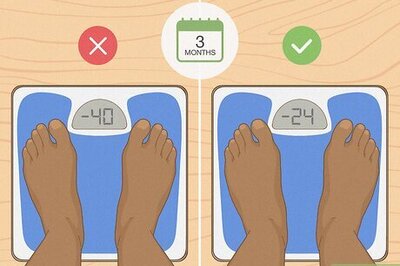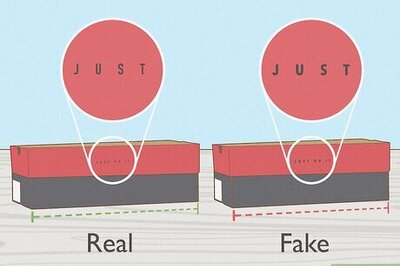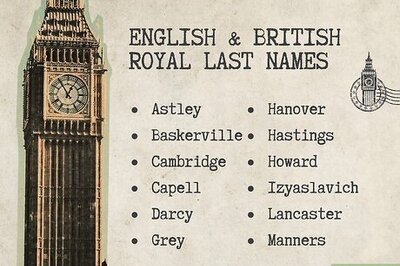
views
After New Zealand’s Prime Minister Jacinda Ardern announced her resignation, many headlines called it a ‘shock move’. Loved internationally – for her ‘progressive’ brand of politics and the fact that she was the youngest female head of government when she assumed the crown – her resignation came as less of a shock to New Zealand itself, which has apparently seen a drubbing of the Labour party.
“I am human. We give as much as we can for as long as we can and then it’s time. And for me, it’s time,” she said at a meeting of members of her Labour Party. Ardern announced her resignation on February 7, less than three years after winning a landslide election to secure her second term.

“I’m leaving, because with such a privileged role comes responsibility. The responsibility to know when you are the right person to lead and also when you are not. I know what this job takes. And I know that I no longer have enough in the tank to do it justice. It’s that simple,” she said.
The Labour Struggle
Ardern’s government has struggled since the peak of “Jacindamania” in 2020, with its popularity hampered by soaring inflation, a looming recession, and a resurgent conservative opposition, AFP reported.
Ardern’s election as Prime Minister in 2017 was a watershed moment in New Zealand politics, according to Grant Duncan, Associate Professor in Massey University, and her decision to step down could be a game changer in the October election.
In a Conversation report, Duncan argues that Ardern remains ahead of National’s Christopher Luxon in the preferred PM polls (slated for October). As a result, it was not necessary for Labour to change their leader, he said, adding that everyone had been predicting a change in government to a National/Act coalition later this year.
Now that Labour is trailing in the polls, a leadership change does not necessarily jeopardise the party’s chances of winning in October. The pandemic’s social and economic consequences have been so severe that having a fresh new face could help Labour’s chances, he said.
He explains that former National Prime Minister John Key did a similar thing in 2016, invoking the same “not enough in the tank” line as Ardern, when he unexpectedly stepped down and handed over to Bill English.
In the following year’s election, English and National received 44% of the vote. National was unable to form government due to overall arithmetic, and Ardern went on to become Prime Minister.
“The public do like shiny and new. The new prime minister can almost count on a bump in the next round of polls from a curious public. And in theory, a skilled politician can distance themselves from unpopular and polarising policies, and start afresh on tackling inflation,” wrote Journalist Andrea Vance for New Zealand’s publication Stuff.
More Popular Internationally than Nationally?
Ardern received international acclaim for her compassionate handling of the 2019 Christchurch mosque massacre, which killed 51 Muslim worshippers and injured another 40. She was praised later that year for her decisive leadership during the deadly White Island (also known as Whakaari) volcano eruption.
She had expressed pride in her government’s actions on housing affordability, climate change, and child poverty on Thursday.
“And we’ve done it while responding to some of the most serious threats to our nation’s health and economic well-being, arguably since World War II,” Ardern had said.
Ardern was featured on the covers of British Vogue and Time magazine, giving the impression that she was more popular abroad than she was at home. She was a domestic force at one point, but her government has been steadily losing ground in polls over the last year, according to AFP.

A Guardian report in December 2022 said that going by new polling, support for New Zealand’s Labour Party had dropped to its lowest level since it came to power in 2017, owing to growing dissatisfaction with the high cost of living, rising interest rates, and concerns about crime.
According to a Kantar One News Poll, Labour, down 1% to 33%, would be unable to form a government with likely coalition partners the Green party, which remained stable at 9%, and the Mori party, which remained stable at 2%.
The right bloc, led by the center-right National party, increased its lead by 1% to 38%, while the Libertarian Act party increased its lead by 2% to 11%, putting the two parties in a strong position to form a government without the need for additional coalition partners.
“It’s about time. She’s wrecked the economy and food prices have skyrocketed,” Esther Hedges from Cambridge on New Zealand’s north island told AFP. “I’m not happy with her and I don’t know anyone who is,” the 65-year-old added.
Christina Sayer, 38, told AFP that Ardern was “the best prime minister we have had”. “I like the type of person she is and she cares about people. I’m sorry to see her go.”
Burn-out Evident?
While Ardern’s speech signalled an evident burnout as the reason, the signs seemed visible from before. She showed a rare lapse of poise last month when she was unwittingly caught calling an opposition politician an “arrogant prick”.
【According to the WHO, “burn-out is a syndrome conceptualized as resulting from chronic workplace stress that has not been successfully managed. It is characterized by three dimensions:
feelings of energy depletion or exhaustion;
increased mental distance from one’s job, or feelings of negativism or cynicism related to one’s job; and
reduced professional efficacy.”】
During parliamentary debate earlier, the prime minister’s muttered remark was caught on a hot mic after a series of questions from David Seymour, leader of New Zealand’s libertarian right Act party. “He’s such an arrogant prick,” she said as she took her seat next to deputy prime minister and close political ally Grant Robertson. After Seymour demanded an apology, her microphone picked up the remark and recorded it in the official parliamentary record, Hansard.
But after the acrimonious exchange went viral, the normally diametrically opposed politicians banded together in a show of Christmas spirit to sign and auction off a copy of the parliamentary record for charity. All proceeds would benefit prostate cancer research “for pricks everywhere,” the auction had said.
Read all the Latest Explainers here



















Comments
0 comment